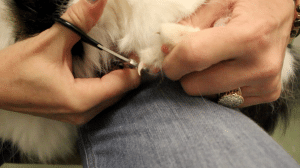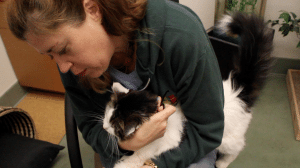How and Why to Trim Your Cat’s Nails: A Complete Guide for Cat Parents
Pet parents know the importance of regularly trimming a dog’s nails, but did you know that regularly trimming a cat’s nails is just as important? For many of the same reasons as for dogs, cats need their nails regularly clipped to enhance their quality of life. In this blog and video, we’ve presented some basics on trimming your cat’s nails.
Why Trimming Your Cat’s Nails Is So Important
First and foremost, trimming your cat’s nails keeps him healthy and comfortable. When their nails get too long, they can begin to curl inwards towards their paws, making it difficult to walk correctly. Over time, this can affect their gait and certainly begin to affect their activity level (if your toenails were overgrown and painful, would you still go for those early morning runs?). Trimming them keeps your kitty active and getting the exercise they need to stay fit.
Another reason for nail trimming is furniture salvation. We all know how cats love to scratch and knead on almost anything they can conveniently get their paws on. As a matter of fact, scratching serves a more useful purpose than we dim-witted humans think. Scratching allows your cat to stretch their back and shoulder muscles, shed dead outer layers of nail, and leave their scent on and around their territory (using the scent glands located in their paw pads).
Although scratching is vital to your cat’s happiness, that expensive Pottery Barn loveseat may be vital to yours, so in order to keep it as pristine and intact as possible, clip that cat’s claws (a well-placed scratching post will help, too!).
A third reason for trimming your cat’s nails (and this one’s a biggie) is keeping YOU safe. Although you adore your precious “little ball of fur,” (The Big Bang Theory, anyone?), occasionally they will skewer you with their claws of death, whether intentionally or not. To minimize the carnage, trim their nails on a regular basis and show them that, although you respectfully acknowledge that they have descended from man-eating sabor-toothed tigers, you deserve a little respect, too.
How Often Should You Trim Your Cat’s Nails?
The frequency of nail trimming depends on the individual cat and situation. If you have a kitten, you may want to give him a trim (or at least check for trimming) fairly frequently so that he gets used to the process, thereby making your life much easier down the 
Top 3 Cat Nail Trimming Methods That Actually Work
While the best advice is to use whatever method is most comfortable for you and your cat, here are 3 ways that Pet Camp counselors have successfully trimmed cat nails:

- Football cat: hold your kitty under your arm as if you are running him down the field for a touchdown. While sitting down, circle your arm around him to secure him, and with that hand gently press down on his paw to make his nails extend. With your other hand, clip any long nails you see, careful to avoid the pink vein or “quick.” Work carefully, but quickly, so as to avoid agitating him more than is necessary.
- Burrito cat: using a towel or blanket, make your cat resemble everyone’s favorite after-hours Mission district meal and wrap him up like a tasty burrito! This method helps keep him calm and gently restrained, and keeps the novice nail trimmer safe and confident.
- Baby or Toddler cat: this is my own personally-preferred way to trim cat nails, but, in all honesty, should only be attempted on a cat that is pretty tolerant. As if holding a toddler or baby on your lap. Sit kitty belly-side up with legs facing forward and cradle as you cut. Again, this is not for the faint of heart or for a challenging cat.
What If You’re Too Nervous to Trim at Home?
If after reading this blog and watching our handy-dandy video you’re still not sure what to do, bring your little Mittens down to our Cat Safari location and let the experts do it for you! At only $20, it’s a bargain and well worth the time, anxiety and possible blood you’ll save trying to wing it yourself. Whatever you choose to do, don’t neglect this important part of cat health and happiness. Remember: a happy cat is where it’s at!
Thanks for reading!
